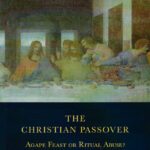
Conclusion
Conclusion
Written by Stephen Perks

Appendix C: The Athanasian Creed
Appendix C: The Athanasian Creed
Written by Gary DeMar & Peter Leithart

Chapter 21: The Great Harlot (Revelation 17-19)
Chapter 21: The Great Harlot (Revelation 17-19)
Written by David Chilton

022: Why Have Evangelical Christians Changed Their Views on Human Sexuality?
022: Why Have Evangelical Christians Changed Their Views on Human Sexuality?
Written by
Charles Roberts and Andrea Schwartz discuss why many in the church are abandoning God’s law regarding human sexuality in Episode #22 of the Out of the Question Podcast.

17: Meet a Host: Dustin Ranem
17: Meet a Host: Dustin Ranem
Written by
There’s no reason to listen this week. We interviewed Dustin Ranem. What a boring guy. Not much to see here. Move along.

Freedom Conference: The Biblical, Christian Duty to Rebel
Freedom Conference: The Biblical, Christian Duty to Rebel
Written by
Session 1 at the 2016 Freedom Conference in Tucumcari, New Mexico. Immanuel Baptist Church hosted Bojidar Marinov as featured speaker. In this opening session, we begin to talk about the prevalent, but greatly mistaken, interpretation of Romans 13:1-7 that would have Christians yield unqualified obedience to even the worst of civil states. Marinov shows that, in its historical context (specifically, the pagan concept of “oneness of being,” which animated the Roman empire,) Paul’s words in that passage are actually revolutionary, and not merely in the sense of “innovative.” They are revolutionary in the sense of “seditious,” and they spelled the eventual end of that beastly empire.

The Christian Passover: Agape Feast or Ritual Abuse?
Written by Stephen Perks
It has been accepted by virtually all Christian traditions that the Last Supper was a Passover meal. It has also been accepted by virtually all Christian traditions that in the early Church the Lord’s Supper, for which the Last Supper is the model and pattern, was celebrated as part of a common fellowship meal, the agape feast. Yet by the second half of the first millennium the Lord’s Supper had been separated from the Agape and the Church had banned the celebration of the latter in church buildings with the result that it fell into complete disuse. Why did this happen? The reason is to be found in the fact that it was difficult to transform the Agape into a clergy-controlled and regulated ritual, whereas the Eucharist, separated from the Agape and accompanied by an expanding liturgy, was easily transformed into a rite that could be sacralised and subjected to clerical domination.
The life of the Church was then redefined and its most important communal expressions were transformed into rituals performed by the priesthood (sacerdotalism). The ability of the Christian community, the Christian society, to achieve the potential of its life as the true social order was restricted as an inevitable consequence. If the Church is to fulfil the task entrusted to her by her Lord in the Great Commission Christians must reclaim their citizenship of the Kingdom of God from those who have sought to dispossess them of it for so long. Centralised bureaucratic control of the Church by clergymen has vitiated the life of the Church as a social order and wrecked the mission of the Church. The life of the Church as the true society, the true social order, must be restored if the Great Commission is to be accomplished, and the combined Eucharist and Agape is an important element of that life, since it is the central ritual of the Christian Church and therefore vital to the well-being of the Christian community.

Part 2: Question 10: What Role Does Israel Play in Postmillennialism?
Part 2: Question 10: What Role Does Israel Play in Postmillennialism?
Written by Gary North and Gary Demar

Appendix 5: Revelation
Appendix 5: Revelation
Written by Ray Sutton

#22: The Meat of the Word Q&A
#22: The Meat of the Word Q&A
Written by
